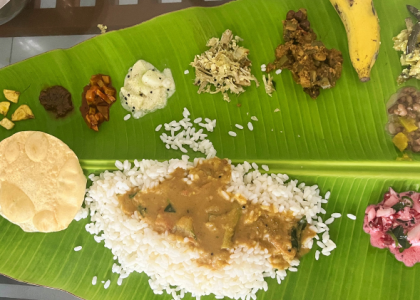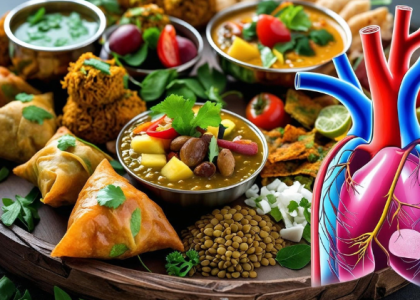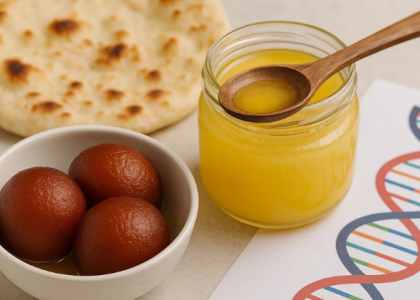Many South Asians love seafood dishes – from Bengali prawn curry to Goan shrimp balchao. But if you’re concerned about heart health, you might wonder if shrimp is a safe choice. After all, shrimp has long had a reputation for being high in cholesterol.
Let’s clear up the confusion about shrimp and heart health with some straight facts and the latest science.
Understanding Cholesterol in Food vs. Your Blood
First, it’s important to know the difference between:
Dietary cholesterol – This is cholesterol found in foods like eggs, shrimp, and meat.
Blood cholesterol – This is cholesterol that circulates in your bloodstream and can affect your heart health.
These two are not the same thing! Many people assume that eating foods high in cholesterol automatically raises blood cholesterol levels. But the connection isn’t that simple.
Why Shrimp is Different from Other High-Cholesterol Foods
It’s true that shrimp contains quite a bit of cholesterol – about 200 milligrams in a 3.5-ounce serving. But here’s what makes shrimp special:
- Very low in saturated fat – Shrimp contains less than 1.5 grams of total fat per serving with almost no saturated fat. This is important because saturated fat has a much stronger effect on raising blood cholesterol than dietary cholesterol does.
- Rich in omega-3 fatty acids – These healthy fats actually help improve your cholesterol profile and reduce inflammation.
- High in nutrients – Shrimp provides high-quality protein, vitamin B12, selenium, and other nutrients important for heart health.
This unique nutritional profile means that shrimp affects your body differently than other high-cholesterol foods like fatty meats.
What Studies Show About Shrimp and Heart Health
Research has changed how we view shrimp and heart health. Here are some key findings:
- A landmark study from Rockefeller University tested a shrimp-based diet on participants for three weeks. While LDL (“bad”) cholesterol increased by about 7%, HDL (“good”) cholesterol increased by 12%, and triglycerides (another type of fat in your blood) decreased by 13%. The overall effect was actually beneficial for heart health markers.
- Recent analyses using the National Health and Nutrition Examination Survey (NHANES) data found that people who consumed shrimp regularly had lower rates of heart failure, coronary artery disease, and stroke compared to those who didn’t eat shrimp.
- Multiple studies have shown that the cholesterol in seafood doesn’t appear to negatively impact heart health the way that saturated fats do.
- Research indicates the omega-3 fatty acids in seafood like shrimp may help reduce inflammation and provide heart benefits beyond what can be measured by cholesterol numbers alone.
Special Considerations for South Asians
South Asian populations have higher rates of heart disease than other groups, so heart-healthy eating is especially important. The MASALA study (Mediators of Atherosclerosis in South Asians Living in America) has found that:
- South Asians have higher rates of diabetes, high blood pressure, and certain cholesterol abnormalities that increase heart risk.
- Traditional South Asian diets vary widely – from vegetarian diets sometimes high in dairy and saturated fats to diets rich in seafood.
- Heart disease prevention guidelines might need to be more stringent for South Asians than for other populations.
Given these factors, including seafood like shrimp in a South Asian diet can be beneficial, as it provides protein with minimal saturated fat.
How to Include Shrimp in a Heart-Healthy South Asian Diet
If you enjoy shrimp, here are ways to make it part of a heart-healthy eating pattern:
Cooking Methods Matter
- Try: Grilling, steaming, boiling, or cooking in minimal oil
- Avoid: Deep frying, cooking in lots of ghee or coconut oil, or heavy cream-based curries
Healthy South Asian Shrimp Preparations
- Shrimp curry made with tomatoes, onions, and spices (using minimal oil)
- Tandoori-style shrimp with yogurt and spices
- Simple stir-fry with vegetables and minimal oil
- Shrimp tikka with lots of veggies
Balance Your Meal
- Serve shrimp with plenty of vegetables
- Include fiber-rich foods like whole grains and legumes
- Limit saturated fats from other sources in the same meal
The Bottom Line on Shrimp and Heart Health
Despite containing cholesterol, shrimp can be part of a heart-healthy diet for most people, including South Asians. Here’s why:
- The cholesterol in shrimp doesn’t raise blood cholesterol in the same way as saturated fats.
- Shrimp provides valuable nutrients and healthy omega-3 fats.
- Studies show overall favorable effects on heart health markers from consuming shrimp.
Of course, everyone’s health situation is different. If you have existing heart disease, diabetes, or other health concerns, talk with your healthcare provider about your specific dietary needs.
The key is moderation and preparation method. Enjoy shrimp as part of a balanced diet that includes plenty of vegetables, fruits, whole grains, and legumes – core components of a heart-healthy eating pattern for South Asians.
References
- De Oliveira E Silva, E. R., et al. (1996). “Effects of shrimp consumption on plasma lipoproteins.” American Journal of Clinical Nutrition, 64(5), 712-717. Link
- American Heart Association. (2023). “Here’s the latest on dietary cholesterol and how it fits in with a healthy diet.” Link
- Anand, R. G., et al. (2020). “Impact of a High-Shrimp Diet on Cardiovascular Risk.” Mayo Clinic Proceedings, 96(2). Link
- Medical News Today. (2023). “Shrimp and cholesterol: Nutrition and heart health.” Link
- Healthline. (2024). “Is Shrimp Good for You? Nutrition, Calories & More.” Link
- American Heart Association. (2023). “Why are South Asians dying of heart disease? MASALA looks for answers.” Link
- Harvard Health. (2025). “Seafood selections that help your heart — and our planet.” Link




